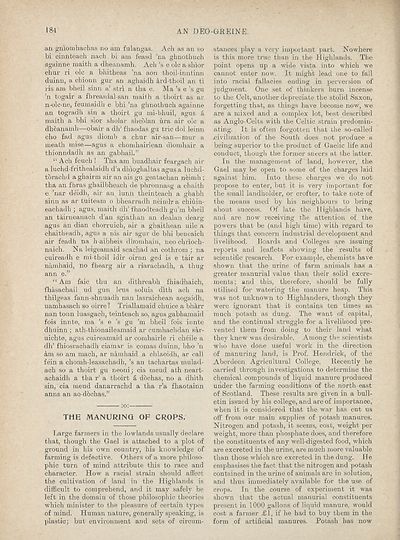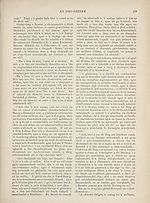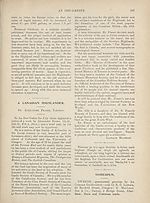An Comunn Gàidhealach Publications > Deo-gréine > Volume 10, October 1914-September 1915
(192) Page 184
Download files
Complete book:
Individual page:
Thumbnail gallery: Grid view | List view

184
AN DEO-GREINE.
an gniorahachas no am fulangas. Ach as an so
bi cinnteach nach bi am feasd ’na ghnothuch
againne maith a dheanamh. Ach’s e ole a sh'ior
chur ri ole a bhitheas ’na aon thoil-inntinn
duinn, a chionn gur an aghaidh &rd-thoil an ti
iis am bheil sinn a’ stri a tha e. Ma’s e’s gu
’n togair a fhreasdal-san maith a thoirt as ar
n-olc-ne, feumaidh e bhi ’na ghnothuch againne
an togradh sin a thoirt gu mi-bhuil, agus a
maith a bhi sior sholar sheblan ura air ole a
dheanamh—obair a dh’ fhaodas gu trie dol leinn
cho fad agus diomb a chur air-san—mur a
meath mise—agus a chomhairlean diomhair a
thionndadh as an gabhail.”
“ Ach feuch ! Tha am buadhair feargach air
a luchd-frithealaidh d’a dhioghaltas agus a luchd-
tbrachd a ghairm air an ais gu geatachan nbimh;
tha an fhras ghailbheach de phronnasg a chaith
e ’nar deidh, air an lunn theinteach a ghabh
sinn as ar tuiteam o bhearradh neimlr a chiuin-
eachadh ; agus, maith dh’ fhaodteadh gu’m bheil
an tairneanach d’an sgiathan an dealan dearg
agus an dian chorruich, air a ghaithean uile a
chaitheadh, agus a nis air sgur de bhi beucaich
air feadh na h-aibheis dhomhain, neo chrioch-
naich. Na leigeamaid seachad an cothrom : na
cuireadh e mi-thoil idir oirnn ged is e tair ar
namhaid, no fhearg air a riarachadh, a thug
ann e.”
“ Am faic thu an dithreabh fhiadhaich,
fhasachail ud gun leus soluis dith ach na
thilgeas fann-shnuadh nan lasraichean aogaidh,
uamhasach so oirre1? Triallamaid chuice a bharr
nan tonn luasgach, teinteach so, agus gabhamaid
fois innte, ma ’s e ’s gu ’m bheil fois innte
dhuinn ; ath-thionaileamaid ar cumhachdan sar-
uichte, agus cuireamaid ar comhairle ri cheile a
dh’ fhiosrachadh ciamar is comas duinn, bho ’n
am so am mach, ar nimhaid a chlaoidh, ar call
fein a chomh-leasachadh, ’s an tachartas mulad-
ach so a thoirt gu neoni; cia meud ath neart-
achaidh a tha r’ a thoirt a dbchas, no a dhith
sin, cia meud danarrachd a tha r’a fhaotainn
anns an ao-d6chas.”
THE MANURING OF CROPS.
Large farmers in the lowlands usually declare
that, though the Gael is attached to a plot of
ground in his own country, his knowledge of
farming is defective. Others of a more philoso¬
phic turn of mind attribute this to race and
character. How a racial strain should affect
the cultivation of land in the Highlands is
difficult to comprehend, and it may safely be
left in the domain of those philosophic theories
which minister to the pleasure of certain types
of mind. Human nature, generally speaking, is
plastic; but environment and sets of circum¬
stances play a very important part. Nowhere
is this more true than in the Highlands. The
point opens up a wide vista into which we
cannot enter now. It might lead one to fall
into racial fallacies ending in perversion of
judgment. Gne set of thinkers burn incense
to the Celt,'another depreciate the stolid Saxon,
forgetting that, as things have become now, we
are a mixed and a complex lot, best described
as Anglo-Celts with the Celtic strain predomin¬
ating. It is often forgotten that the so-called
civilization of the South does not produce a
being superior to the product of Gaelic life and
conduct, though the former sneers at the latter.
In the management of land, however, the
Gael may be open to some of the charges laid
against him. Into these charges we do not
propose to enter, but it is very important for
the small landholder, or crofter, to take note of
the means used by his neighbours to bring
about success. Of late the Highlands have,
and are now receiving the attention of the
powers that be (and high time) with regard to
things that concern industrial development and
livelihood. Boards and Colleges are issuing
reports and leaflets showing the results of
scientific research. For example, chemists have
shown that the urine of farm animals has a
greater manurial value than their solid excre¬
ments; and this, therefore, should be fully
utilised for watering the manure heap. This
was not unknown to Highlanders, though they
were ignorant that it contains ten times as
much potash as dung. The want of capital,
and the continual struggle for a livelihood pre¬
vented them from doing to their land what
they knew was desirable. Among the scientists
who have done useful work in the direction
of manuring land, is Prof. Hendrick, of the
Aberdeen Agricultui-al College. Recently he
carried through investigations to determine the
chemical compounds of liquid manure produced
under the farming conditions of the north-east
of Scotland. These results are given in a bull¬
etin issued by his college, and are of importance,
when it is considered that the war has cut us
off from our main supplies of potash manures.
Nitrogen and potash, it seems, cost, weight per
weight, more than phosphate does, and therefore
the constituents of any well-digested food, which
are excreted in the urine, are much more valuable
than those which are excreted in the dung. He
emphasises the fact that the nitrogen and potash
contained in the urine of animals are in solution,
and thus immediately available for the use of
crops. In the course of experiment it was
shown that the actual manurial constituents
present in 1000 gallons of liquid manure, would
cost a farmer £1, if he had to buy them in the
form of artificial manures. Potash has now
AN DEO-GREINE.
an gniorahachas no am fulangas. Ach as an so
bi cinnteach nach bi am feasd ’na ghnothuch
againne maith a dheanamh. Ach’s e ole a sh'ior
chur ri ole a bhitheas ’na aon thoil-inntinn
duinn, a chionn gur an aghaidh &rd-thoil an ti
iis am bheil sinn a’ stri a tha e. Ma’s e’s gu
’n togair a fhreasdal-san maith a thoirt as ar
n-olc-ne, feumaidh e bhi ’na ghnothuch againne
an togradh sin a thoirt gu mi-bhuil, agus a
maith a bhi sior sholar sheblan ura air ole a
dheanamh—obair a dh’ fhaodas gu trie dol leinn
cho fad agus diomb a chur air-san—mur a
meath mise—agus a chomhairlean diomhair a
thionndadh as an gabhail.”
“ Ach feuch ! Tha am buadhair feargach air
a luchd-frithealaidh d’a dhioghaltas agus a luchd-
tbrachd a ghairm air an ais gu geatachan nbimh;
tha an fhras ghailbheach de phronnasg a chaith
e ’nar deidh, air an lunn theinteach a ghabh
sinn as ar tuiteam o bhearradh neimlr a chiuin-
eachadh ; agus, maith dh’ fhaodteadh gu’m bheil
an tairneanach d’an sgiathan an dealan dearg
agus an dian chorruich, air a ghaithean uile a
chaitheadh, agus a nis air sgur de bhi beucaich
air feadh na h-aibheis dhomhain, neo chrioch-
naich. Na leigeamaid seachad an cothrom : na
cuireadh e mi-thoil idir oirnn ged is e tair ar
namhaid, no fhearg air a riarachadh, a thug
ann e.”
“ Am faic thu an dithreabh fhiadhaich,
fhasachail ud gun leus soluis dith ach na
thilgeas fann-shnuadh nan lasraichean aogaidh,
uamhasach so oirre1? Triallamaid chuice a bharr
nan tonn luasgach, teinteach so, agus gabhamaid
fois innte, ma ’s e ’s gu ’m bheil fois innte
dhuinn ; ath-thionaileamaid ar cumhachdan sar-
uichte, agus cuireamaid ar comhairle ri cheile a
dh’ fhiosrachadh ciamar is comas duinn, bho ’n
am so am mach, ar nimhaid a chlaoidh, ar call
fein a chomh-leasachadh, ’s an tachartas mulad-
ach so a thoirt gu neoni; cia meud ath neart-
achaidh a tha r’ a thoirt a dbchas, no a dhith
sin, cia meud danarrachd a tha r’a fhaotainn
anns an ao-d6chas.”
THE MANURING OF CROPS.
Large farmers in the lowlands usually declare
that, though the Gael is attached to a plot of
ground in his own country, his knowledge of
farming is defective. Others of a more philoso¬
phic turn of mind attribute this to race and
character. How a racial strain should affect
the cultivation of land in the Highlands is
difficult to comprehend, and it may safely be
left in the domain of those philosophic theories
which minister to the pleasure of certain types
of mind. Human nature, generally speaking, is
plastic; but environment and sets of circum¬
stances play a very important part. Nowhere
is this more true than in the Highlands. The
point opens up a wide vista into which we
cannot enter now. It might lead one to fall
into racial fallacies ending in perversion of
judgment. Gne set of thinkers burn incense
to the Celt,'another depreciate the stolid Saxon,
forgetting that, as things have become now, we
are a mixed and a complex lot, best described
as Anglo-Celts with the Celtic strain predomin¬
ating. It is often forgotten that the so-called
civilization of the South does not produce a
being superior to the product of Gaelic life and
conduct, though the former sneers at the latter.
In the management of land, however, the
Gael may be open to some of the charges laid
against him. Into these charges we do not
propose to enter, but it is very important for
the small landholder, or crofter, to take note of
the means used by his neighbours to bring
about success. Of late the Highlands have,
and are now receiving the attention of the
powers that be (and high time) with regard to
things that concern industrial development and
livelihood. Boards and Colleges are issuing
reports and leaflets showing the results of
scientific research. For example, chemists have
shown that the urine of farm animals has a
greater manurial value than their solid excre¬
ments; and this, therefore, should be fully
utilised for watering the manure heap. This
was not unknown to Highlanders, though they
were ignorant that it contains ten times as
much potash as dung. The want of capital,
and the continual struggle for a livelihood pre¬
vented them from doing to their land what
they knew was desirable. Among the scientists
who have done useful work in the direction
of manuring land, is Prof. Hendrick, of the
Aberdeen Agricultui-al College. Recently he
carried through investigations to determine the
chemical compounds of liquid manure produced
under the farming conditions of the north-east
of Scotland. These results are given in a bull¬
etin issued by his college, and are of importance,
when it is considered that the war has cut us
off from our main supplies of potash manures.
Nitrogen and potash, it seems, cost, weight per
weight, more than phosphate does, and therefore
the constituents of any well-digested food, which
are excreted in the urine, are much more valuable
than those which are excreted in the dung. He
emphasises the fact that the nitrogen and potash
contained in the urine of animals are in solution,
and thus immediately available for the use of
crops. In the course of experiment it was
shown that the actual manurial constituents
present in 1000 gallons of liquid manure, would
cost a farmer £1, if he had to buy them in the
form of artificial manures. Potash has now
Set display mode to:
![]() Universal Viewer |
Universal Viewer | ![]() Mirador |
Large image | Transcription
Mirador |
Large image | Transcription
| An Comunn Gàidhealach > An Comunn Gàidhealach Publications > Deo-gréine > Volume 10, October 1914-September 1915 > (192) Page 184 |
|---|
| Permanent URL | https://digital.nls.uk/125241768 |
|---|
| Description | Leabhar 10, Mìos Deireannach an Fhogharaidh 1914 gu Darna Mìos an Fhogharaidh 1915 |
|---|---|
| Attribution and copyright: |
|
| Description | This contains items published by An Comunn, which are not specifically Mòd-related. It includes journals, annual reports and corporate documents, policy statements, educational resources and published plays and literature. It is arranged alphabetically by title. |
|---|
| Description | A collection of over 400 items published by An Comunn Gàidhealach, the organisation which promotes Gaelic language and culture and organises the Royal National Mòd. Dating from 1891 up to the present day, the collection includes journals and newspapers, annual reports, educational materials, national Mòd programmes, published Mòd literature and music. |
|---|---|
| Additional NLS resources: |
|

